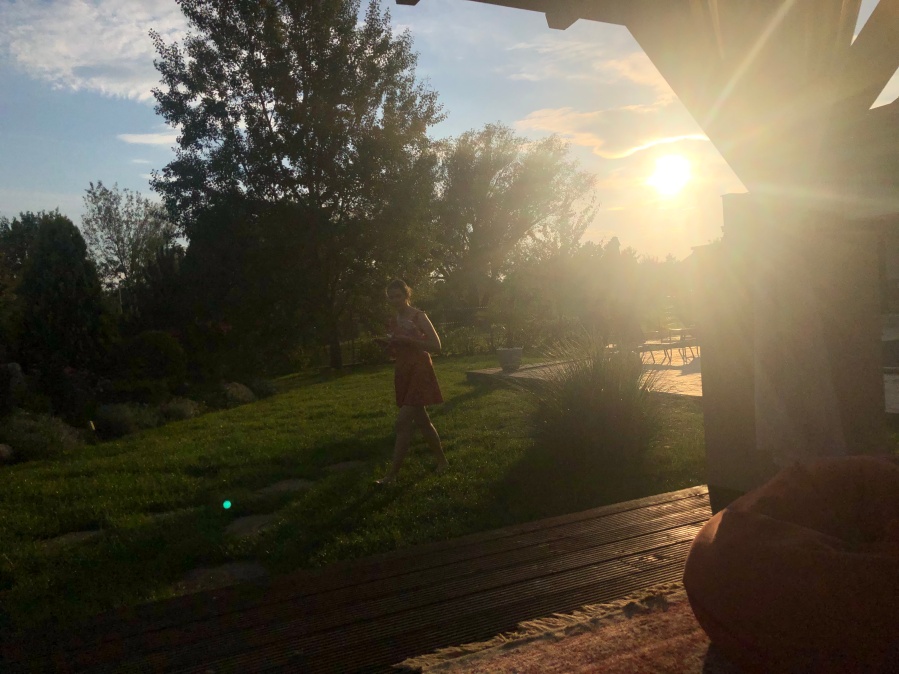In 2002, my Hungarian grandparents got a new car after 30 years of driving an East German Trabant. This was a Suzuki Swift, the sort of car that you can find parked on every street in Budapest. The car was tan, small, otherwise nondescript. But it was new, and reliable, and unlike the Trabant, all four doors closed.
***
Seventeen years later, when I moved to Hungary from the U.S. with no plan to move back, I was the one driving the Suzuki.
It was early June, and my friends and I had planned a three-day trip to Lake Balaton, the Hungarian “seaside” in a landlocked country.

The Suzuki remained reliable. Well, mostly. The trunk refused to close completely, so I attempted to prevent its bop-bopping along the highway by sealing it shut with duct tape.
The air conditioning was out too. This was a problem, as five of us squeezed in the car. We were an international group: Me, driving. Zach — a U.S. American — in the passenger seat. In the back: Colombian Juliana, half-Polish/half-Dutch Patryk, and his girlfriend, Hungarian Anita.
I insisted on taking the car rather than the train. I needed to drive the car so its battery wouldn’t die, and, as I told my friends, “We can stop at places on the way there and back. I’m gonna show you guys a real American road trip.”

I kept one secret from them about the Real American Road Trip (™): Something always goes wrong. Anyway, I thought, surely the busted AC would be that thing.
I should have known. It’s never quite that simple.
The real tragedy struck on the last day as we drove home. After passing through lavender fields and rolling green hills surrounding Balaton, I noticed something funny.
“Weird,” I said. “I’m having trouble accelerating.”
“Maybe try a lower gear?” Juliana suggested.
Lower gear. Okay, maybe. So I did. It worked for a bit, but the car still wasn’t driving as smoothly as it should have been.
When we got onto the highway and drove by Veszprém, we smelled something funny through the open windows.
“I think we just passed a factory,” Patryk said.
We all agreed — yes, yes. The smell came from the factory. Totally. Definitely not the car. We continued to sing along to the nostalgic music coming from Zach’s speaker (which I forced him to bring because, frankly, the car radio wasn’t working either), convinced that if we sang loud enough to Cascada’s “Everytime We Touch,” then everything would be all right.
About two minutes later, in the middle of the Spice Girls’ song “Stop!”, the car obediently listened to the song. It stopped.
It wasn’t a sudden stop. At first I couldn’t change the gears. I frantically moved the gear stick from side to side, trying to slide it into place. But the stick stubbornly refused.
Shit, I thought. We’re going to die on a Hungarian highway.
After what felt like an hour (it was more like 20 seconds), I managed to slide it into third gear. But when I pressed my right foot on the gas and heard the engine revving, I couldn’t feel any power. We simply weren’t accelerating. In fact, the car was slowing down.
Shit, shit, shit.
Zach pointed out a side road a few feet ahead, so I turned onto it and stopped. I took the key out of the ignition, hoping, praying, that I just needed to restart the car and everything would be okay.
It wasn’t okay.
We were stuck.

***
Képzeld el (or “imagine this,” as Hungarians say): Five twenty-somethings lost, stuck, flat land all around us. Cars whizzed past us several feet away on the highway
The good news was this: The weather was beautiful. In terms of days to be stranded in the middle of the Hungarian countryside, mid-70s Fahrenheit with clear blue skies was ideal.
The bad news was this: I was panicking. As Patryk popped the hood of the car, I could feel my hands sweating, a heat rising to my head. I couldn’t help but think about one of my favorite short stories, “A Good Man is Hard to Find,” by Flannery O’Connor.
What’s gonna happen if some guy with a dumb nickname like The Misfit pulls us into the field and kills us one by one?
Then I remembered that we were in Hungary, not in rural Georgia, where any given stranger has guns stored in their kitchen cabinets or hidden under their beds or hanging over their toilets. I felt a little bit better. But only a little.
My muscled tightened. My heart raced. I pushed down the tears I felt welling up in my eyes.
What the hell happens if nobody stops? Seventeen years, Nagypapa had this car. You drive it a few months, and it dies. And now you’re going to be murdered in the middle of nowhere.
As luck would have it, about 15 minutes into my panic mode, somebody did stop. A dark-skinned, young Roma man poked his head out of his car window.
“Mi a baj?” he asked. “What’s the problem?”
Lucky us, this young man was no Misfit. He knew a bit about cars, so he hopped out of his and examined the Suzuki.
The clutch, he told us, had totally gone out. There was no way we could restart it.
Shit.
This time, I couldn’t stop the tears. My dad trusted me with this car, and I failed him. Of course I had. Had the clutch failed because of my driving? How much would it cost? I thought of my savings disappearing, all because I wanted to have a Real American Road Trip (™) in Hungary. Or, wait.. the car was old. Maybe the clutch was worth more than the car itself. Jesus Christ, I had totaled my grandfather’s car. You stupid, stupid girl. Now you’ve really fucked it.
I snapped out of my panic spiral when the mechanic arrived. The young man had recommended this guy, and I was surprised to see him. This was no Misfit either. Everything about him was small: He was a small man driving a small car with a small flatbed attached to it. No tow truck, no intimidating tough guy attitude.
He smiled, introduced himself, and opened the driver’s door of the Suzuki.
“Ah, here’s the problem,” he said in Hungarian. Then he flicked out a dead bug from the floor, turned around, and chuckled. I think he may have been amused by the look of terror on my face. But I could tell by his kind eyes that he didn’t mean it maliciously. I felt my muscles loosen, just a tad.
The mechanic confirmed what the young man had suspected: The clutch had gone kaput.
“Did an old man drive this car?” the mechanic asked.
“My nagypapa,” I said. I explained that he had driven it almost until his passing last fall, when he was 92 years old.
“Sometimes old men don’t press on the clutch properly, which can wear it down over time,” the mechanic said.
He said he could fix it, but we’d need to leave the car with him so he could order a new clutch.* It would be neither difficult nor expensive. The mechanic also offered to fix the trunk for free — no more duct tape for the little Suzuki.
Finally. Maybe I wasn’t a complete failure who deserved to be shot by the Misfit. Redemption and relief.
In the end, the five of us sprinted across the railroad tracks to catch the last train to Budapest with one minute to spare.
I remember thinking about that Flannery O’Connor story as I looked out the window of the train, and as the sky slowly darkened from its light blue. A good man isn’t so hard to find, after all.
***

*Except the belt to lift the Suzuki onto the flatbed wasn’t working, which meant he had to push it on manually. About four strangers driving along the road stopped to help him. And they say people in Hungary are cold and rude.

Nice story. I’m glad you made it out in one piece. I felt like I was there. Keep writing! G
Thank you for reading, although I was still proofreading the post before I shared it on Facebook — sorry for the typos!